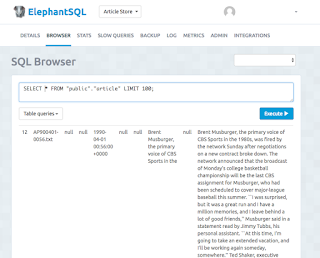- September 29th, 2017: Friday's #haskell problem uses name-parsing to post parsed names into PostgreSQL database and join them to articles. Today's #haskell solution extracts rows of raw names associated with articles, parses then stores them in PostgreSQL.
- September 28th, 2017: Thursday's #haskell problem inserts reified articles into PostgreSQL database, including names, and throws confetti! Today's #haskell solution inserts the articles from our compressed archive. YAY! Throw confetti!
- September 27th, 2017: Wednesday's #haskell problem looks at parsing names in various formats. Today's #haskell solution solves the name-parsing problem by parsing each name-form in turn.
- September 26th, 2017: Tuesday's #haskell problem looks at staging data on PostgreSQL for deferred processing using Haskell for ETL. Today's #haskell solution transforms RawNames to JSON and uploads it to a staging table on the PostgreSQL database.
- September 25th, 2017: Friday we took a compressed archive and broke that into individual articles. Today we divide articles into sections. Today's #haskell solution uncovers structure bit by bit as we reify an article structure from a block of text.
- September 22nd, 2017: Today's #haskell problem we're going to scan into an 'unstructured' set of documents and start to look for structure. Welp, today's #haskell solution is a 'start': from one blob to 11 blocks of raw text. We'll dig in deeper next week.
- September 21st, 2017: TOMORROW's #haskell problem (announced a wee bit early) queries PostgreSQL database to fetch keyword dictionary state. Today's #haskell solution picks up where we left off yesterday then computes the top keywords across articles.
- September 20th, 2017: Today's #haskell problem asks to push keywords extracted from article onto a PostgreSQL data table. Today's #haskell solution pushes keywords – PUSHES KEYWORDS REAL GOOD – to a PostgreSQL database.
- September 19th, 2017: So we've encoded keywords into Ints, today's #haskell problem decodes those ints back to the keywords. Today's #haskell solution 'reverses the arrows' of the Map, decoding a keyword from an index
- September 18th, 2017: Today's #haskell problem computes the relative word 'strength' of each word in a document. Today's #haskell solution breaks the word-strength problem into small pieces then foldM's over the small pieces.
- September 15th, 2017: Today's #haskell problem takes a look at KEA/Keyword Extraction Algorithm. Ooh, doggies! State IO Map KeyWord something-or-otherfor today's #haskell solution.
- September 14th, 2017: Today's #haskell problem involves using the simple interface to PostgreSQL to insert rows of data. Ooh! Exciting! Today's #haskell solution uses ToRow and ToField to insert Haskell values into #PostgreSQL #DaaS instance! lolneat!
- September 13th, 2017: Today's #haskell problem asks the article names have encoded Julian dates ... OR DO THEY? So, in solving today's #haskell problem, I realized THOSE AREN'T JULIAN DATES! THOSE ARE DATE DATES!
- September 8th, 2017: Continuing our ETL exploration with a load/compress/storefor today's #haskell exercise. Today's #haskell solution shows load/compress/store ... that's a word now.
- September 5th, 2017: Today's #haskell exercise is to build a directory web serviceusing the Snap framework [or a framework you prefer]
- September 4th, 2017: Today's #haskell problem reads in source documents and does some word frequency analyses. Today's #haskell solution shows, surprisingly, 'the' is the most popular English word. Or, not so surprisingly.
- September 1st, 2017: Today's #haskell problem #SPARQL-queries wikidata.org to fetch countries' populations for FB analysis. Yesterday, India won FB by population, today we have a surprise winner in Thailand for FB by percentage user base.
Incorporates strong typing over predicate logic programming, and, conversely, incorporates predicate logic programming into strongly typed functional languages. The style of predicate logic is from Prolog; the strongly typed functional language is Haskell.
Saturday, September 30, 2017
September 2017 1HaskellADay problems and solutions
Subscribe to:
Post Comments (Atom)











No comments:
Post a Comment